|
|
|
Sort Order |
|
|
|
Items / Page
|
|
|
|
|
|
|
| Srl | Item |
| 1 |
ID:
113283
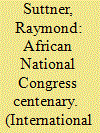

|
|
|
|
|
| Publication |
2012.
|
| Summary/Abstract |
The African National Congress (ANC) in South Africa was formed under difficult conditions, facing a Union government bent on extending racist laws and an unsympathetic British government to whom repeated petitions were addressed without success. By the 1930s petitioning had run its course and the organization collapsed. In the 1940s, however, structures were established which laid the basis for mass activities in the following decade. In the 1950s a range of campaigns of resistance gave rise to a large ANC constituency. It also elaborated an alternative democratic vision through adoption of the Freedom Charter in 1955, after a process of lengthy consultation. The document became a rallying point for a range of democratic organizations. After the Sharpeville massacre in 1960 the ANC was banned, but continued to operate illegally. It embarked on short-lived armed activities, leading to the arrest and exile of its leading figures. The years that followed saw further setbacks as the organization sought to establish itself outside, and in small underground units inside, the country. After the Soweto uprising of 1976, many young people joined the ANC's armed wing and carried out attacks on apartheid installations. Significantly, this period also saw the revival of mass public political activities on an unprecedented scale. A combination of internal and external pressures against apartheid paved the way for negotiations, resulting in democratic elections in 1994. The ANC now governs, having fundamentally, albeit unevenly, transformed the lives of many-but continued poverty, unemployment, extensive corruption and criminality risk leading to a deep systemic crisis affecting governance as a whole.
|
|
|
|
|
|
|
|
|
|
|
|
|
|
|
|
| 2 |
ID:
113288
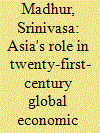

|
|
|
|
|
| Publication |
2012.
|
| Summary/Abstract |
The basic foundations of today's framework for global economic governance were laid in the years following the Second World War. Reflecting the balance of economic power at the time, Asia did not play a major role in either designing the institutional architecture or setting the agenda for global economic governance. In more recent decades the centre of gravity of the global economy has shifted towards Asia, and this trend is likely to continue in the decades to come. Asia's growing economic weight enhances its potential to play a much stronger role in shaping twenty-first-century global economic governance. Realization of that potential will, however, depend upon how successfully Asia addresses five key challenges: rebalancing sources of growth; strengthening national governance; institutionalizing regional integration; providing political leadership; and adopting the global lingua franca-English. While the Asian policy-makers' ambition to play a bigger role in global economic governance is growing, their appetite for addressing the necessary policy challenges is not necessarily keeping pace with that growing ambition. This gap between ambition and action will need to be gradually closed-only then can Asia help itself in playing a bigger role in global economic governance.
|
|
|
|
|
|
|
|
|
|
|
|
|
|
|
|
| 3 |
ID:
113289
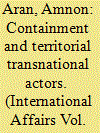

|
|
|
|
|
| Publication |
2012.
|
| Summary/Abstract |
Containment has been salient in intellectual and policy debates for 60 years. It informed US foreign policy towards the USSR and, later, the so-called rogue states. The endurance of containment beyond the Cold War suggests that it possesses the quality of transferability, the capacity of a grand strategy from the past to transcend the circumstances that gave rise to it, to suggest what should be emulated and what avoided in future policies. Drawing on the notion of transferability and on the method of structured, focused comparison, this article uses Israel's foreign policy towards Hezbollah and Hamas to argue that containment is transferable from the state level to a state/territorial transnational actor (TNA) relationship, albeit with permutations. This argument is examined in relation to four issues: the circumstances under which containment arises; its applicability to territorial TNA; the objectives sought by implementing containment; and the role of legitimacy as a component of containment. In so doing the article seeks to make a contribution to the debate on containment. While there is a rich literature on state containment, research on containing territorial TNA has been extremely limited.
|
|
|
|
|
|
|
|
|
|
|
|
|
|
|
|
| 4 |
ID:
113287
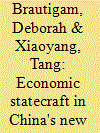

|
|
|
|
|
| Publication |
2012.
|
| Summary/Abstract |
China's rapidly growing economic engagement with other developing countries has aroused intense debates, but these debates have often generated more heat than light. The Chinese government is clearly pushing its companies to move offshore in greater numbers, and state-owned firms figure prominently in many of the major investments abroad. Yet relatively little research exists on when, how and why the Chinese government intervenes in the overseas economic activities of its firms. China's state-sponsored economic diplomacy in other developing countries could play three major strategic roles: strengthening resource security, enhancing political relationships and soft power, and boosting commercial opportunities for national firms. This article examines China's programme to establish overseas special economic zones as one tool of Beijing's economic statecraft. It traces the process by which they were established and implemented, and investigates the characteristics of the 19 zones initially selected in a competitive tender process. The article concludes that even in countries rich in natural resources, the overseas zones were overwhelmingly positioned as commercial projects. Particularly in the Asian zones, China is following in the footsteps of Japan. The zone programme, and the Chinese foreign investment it hoped to foster, represents a clear case of the international projection of China's developmental state. However, in Africa (but not generally elsewhere) discourse surrounding the zones publicly positions them as a transfer of China's own development success, thus potentially enhancing China's political relationships and soft power on the continent.
|
|
|
|
|
|
|
|
|
|
|
|
|
|
|
|
| 5 |
ID:
113285


|
|
|
|
|
| Publication |
2012.
|
| Summary/Abstract |
While economic agendas have been shown to be an important factor in shaping civil wars, there are several problems with prominent explanations centring on rebel 'greed', notably those put forward by Paul Collier. Among these are: the way proxies for 'greed' and 'grievance' have been used; the lack of attention to links between 'greed' and 'grievance'; and the lack of attention to 'greed' among elements associated with counter-insurgencies. Why has Collier's analysis proven so popular, despite its flaws? I suggest that it represents an attractive over-simplification with a scientific aura. It achieves a degree of simplicity by excluding many of the most important features of civil wars, even to the extent of asserting that there is no point in asking rebels about their motivations. Furthermore, it is often politically convenient in that it tends to exclude a number of western governments-and (sometimes favoured) governments in poorer countries-from serious scrutiny. By contrast, the emphasis placed by Frances Stewart and her associates on the role of economic and political inequalities between groups offers a more nuanced understanding of how civil wars are caused and shaped, an understanding that is better able to take account of the nature of grievances and of the role of abusive government-affiliated actors in generating grievances.
|
|
|
|
|
|
|
|
|
|
|
|
|
|
|
|
| 6 |
ID:
113286
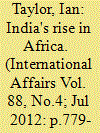

|
|
|
|
|
| Publication |
2012.
|
| Summary/Abstract |
India's rise in Africa has been largely overlooked, despite the important implications of the growing presence of Indian corporations and a rise in New Delhi's political ties with the continent. Not only are Indian actors providing much-needed investment and capital, but Indo-African connections represent a further important diversification of Africa's international relations, something which reflects a major development for the continent. Indian activity in Africa may be said to constitute a middle ground between China's profit-maximizing and largely statist approach and the much-resented intrusive conditionalities associated with western policies. It is evident that India's growing activity in Africa has the potential to help African companies become more efficient by exposing them to competition, new advances in technology and modern labour skills. African governments could potentially use the opportunity of an increased Indian corporate presence in Africa as sources of appropriate technology, skills and advice for economic development. However, if not handled correctly, any goodwill that India possesses in Africa will quickly be squandered and/or India will become just another actor in Africa. It is up to Africans to negotiate with Indian actors to ensure that the benefits accrued from Indo-African ties are evenly shared and that Indian interest in the continent, alongside that of others, may help to serve as a catalyst for economic revitalization. The key issue is how African leaders can seek to leverage newfound Indian investment and interest in Africa so that Africa's place in global trade networks becomes more proactive and beneficial to the continent's citizens.
|
|
|
|
|
|
|
|
|
|
|
|
|
|
|
|
| 7 |
ID:
113284
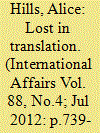

|
|
|
|
|
| Publication |
2012.
|
| Summary/Abstract |
The transfer of democratic values and practices such as community-based policing to African police forces is a key aspect of western aid and security policies, yet the cultural transmission on which it depends is not fully understood; the ways in which African officers respond to theories and practices imported from western societies has yet to be assessed critically. Further, despite decades of international support for police reform and re-education, there is little evidence to support the assumption that the skills, technologies and procedures associated with western policing can act as an effective channel for the transmission of democratic values. This article uses the Nigerian police's response to both externally funded and internally generated reform projects to address a question with implications for policy transfer more generally: what explains the uneven transmission of politically sensitive forms of knowledge? It discusses how imported ideas and practices are received by Nigerian officers and political elites, and how they are transformed having been filtered through local interests and dispositions. It shows that even when the process of reform is accepted, the political will required to ensure its effective implementation is not. Democratic practices do not travel well because recipients respond to imported practices in an adaptive manner, integrating aspects of donor understanding and indigenous realities.
|
|
|
|
|
|
|
|
|
|
|
|
|
|
|
|
| 8 |
ID:
113282
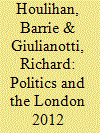

|
|
|
|
|
| Publication |
2012.
|
| Summary/Abstract |
This article traces the emergence of security at the Olympic Games as a key concern of host governments and of the Olympic movement and analyses the implications of this heightened concern for the delivery of the Games, the local host community and for national security policy. It is argued that the Olympic Games, as a high profile media event, provide an increasingly attractive political opportunity structure for a range of political actors-an attraction that is intensified when the Games are held in a world city such as London. Since the 9/11 attacks in New York there has been a sharp increase in security expenditure for the Olympic Games, arguably significantly out of proportion to the likely risk. The cost of security has risen from approximately $108 million in 1996 (Atlanta) to an estimated $1.99 billion in 2012 (London). It is argued that the period since 2001 has been characterized by hyper-insecurity and a culture of intense risk aversion based not on probability but on the possibility of attack. Among the consequences of this development is a desensitization of host nations to the increased securitization of their cities. It is also argued that the impact on the local UK host community of Newham will be significant not only as a result of the intense level of policing, but also owing to the redevelopment associated with the Games and the use of the surveillance infrastructure to create a virtual gated community in the post-Games athletes' village. The article concludes by discussing some of the longer-term implications of the increased securitization of the Olympic Games, including the normalization of intense surveillance, the further encroachment on civil liberties and the growing tension between the values espoused by the Olympic movement and the reality of a successful delivery of the Games.
|
|
|
|
|
|
|
|
|
|
|
|
|
|
|
|
| 9 |
ID:
113281
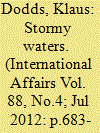

|
|
|
|
|
| Publication |
2012.
|
| Summary/Abstract |
This article considers Britain's relationship with the Falkland Islands and the wider context of UK-Argentine relations. It does so by considering three main themes. First, the current Argentine government's strategy towards the Falklands (Islas Malvinas) and the manner in which the question of disputed ownership has been tied into wider Latin American relationships designed to unsettle UK and Falkland Islands interests. Second, the debate surrounding the defence of the Falklands is examined for the purpose of considering how this issue, especially sensitive given the 30th anniversary of the 1982 conflict, brings into sharp relief the implications of recent defence and spending reviews. Finally, the article aims to assess and evaluate the manner in which the Falkland Islands community engages with and responds to worsening UK-Argentine relations. It is concluded that UK-Argentine relations are in their worst state since 1982 and that there is little or no prospect of any improvement given the Argentine government's commitment to force the UK into entering sovereignty negotiations. On its side, the UK and the Falkland Islands' community do not believe that sovereignty is negotiable and would rather consider how more cordial relations could be established in a manner reminiscent of the late 1990s.
|
|
|
|
|
|
|
|
|
|
|
|
|
|
|
|
|
|
|
|
|